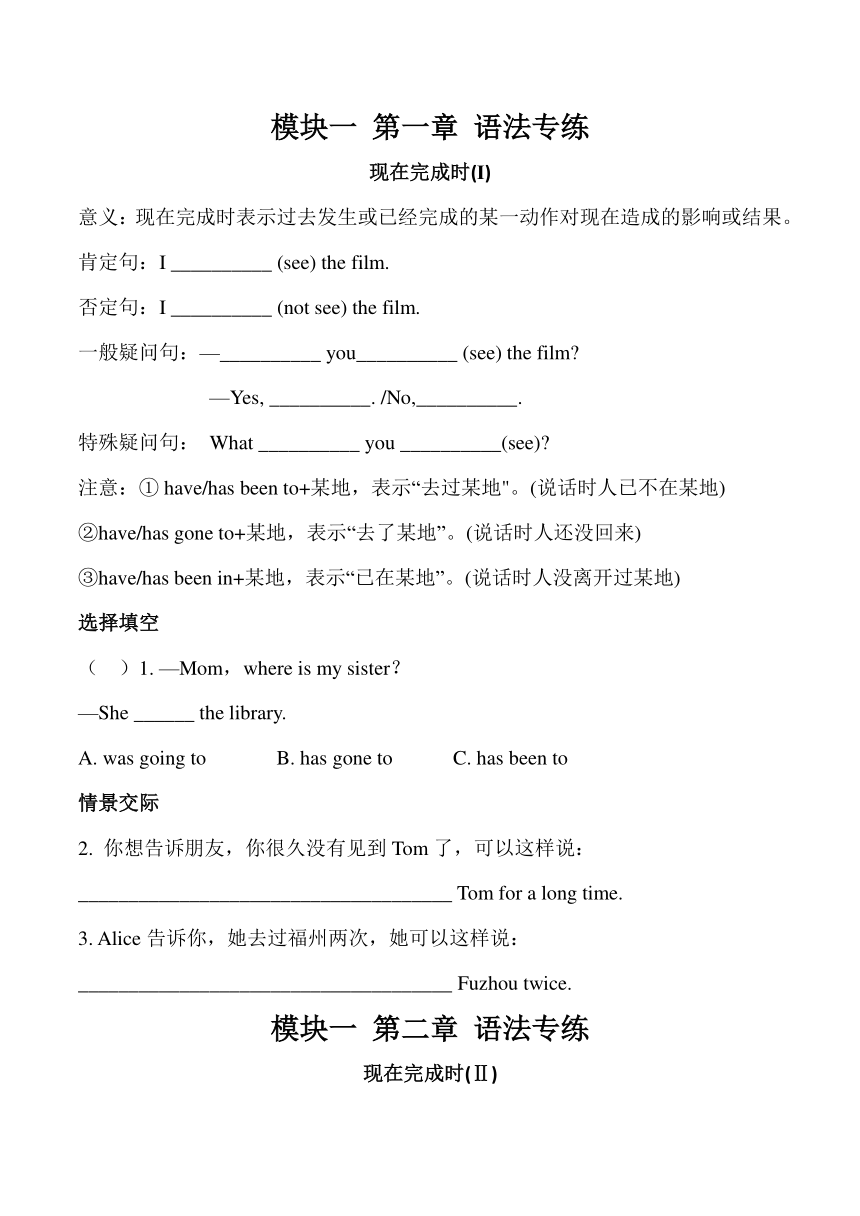
模块一 第一章 语法专练 现在完成时( ) 意义:现在完成时表示过去发生或已经完成的某一动作对现在造成的影响或结果。 肯定句:I _____ (see) the film. 否定句:I _____ (not see) the film. 一般疑问句:—_____ you_____ (see) the film —Yes, _____. /No,_____. 特殊疑问句: What _____ you _____(see) 注意:① have/has been to+某地,表示“去过某地"。(说话时人已不在某地) ②have/has gone to+某地,表示“去了某地”。(说话时人还没回来) ③have/has been in+某地,表示“已在某地”。(说话时人没离开过某地) 选择填空 ( )1. —Mom,where is my sister? —She _____ the library. A. was going to B. has gone to C. has been to 情景交际 2. 你想告诉朋友,你很久没有见到Tom了,可以这样说: _____ Tom for a long time. 3. Alice告诉你,她去过福州两次,她可以这样说: _____ Fuzhou twice. 模块一 第二章 语法专练 现在完成时(Ⅱ) 现在完成时不可以和明确表示过去的时间状语连用,如:yesterday、last year等。常与下列副词连用: 副词 just ever never already yet before 词义 刚刚 曾经 从不 已经 仍;还 之前 常用句型 肯定句 肯定句 疑问句 否定陈述句 肯定陈述句 否定句 疑问句 多种句型 常见位置 过去分词前 过去分词前 过去分词前 过去分词前或者句末 句末 句末 单项选择 ( )1.--Have you returned the library book _____ --Yes, I’ve _____ returned it. A.just;already B.yet;yet C.yet;just ( )2.--Fred’s father is the boss of the factory. --Is that true He has _____ told me about it. A.never B.ever C.already 模块一 第三章 语法专练 现在完成时(Ⅲ) 现在完成时表示从过去某一时刻延续到现在的动作或状态,常与for或since引导的时间状语连用。 完成句子 1. ———你住在福建多久了 ———我住在福建三年了。 —_____ _____ have you lived in Fujian —I have lived in Fujian _____ three years. =I have lived in Fujian _____ three years ago. 表示持续动作或状态的动词多是延续性动词。短暂性动词(短语)在完成时中需转换成延续性动词(短语),常见的转换如下: buy—have come—be get to know—know begin—be on catch a cold—have a cold marry—be married borrow—keep die—be dead leave—be away (from) close—be closed fall ill—be ill join—be a member of/be in 将下列句子改为完成时 2. His father died many years ago. His father _____ _____ _____ for many years. 3. He bought a house in 2005. He _____ _____ a house in 2005. 模块二 第一章 语法专练 现在完成时和一般过去时的区别 时态 用法 时间状语 现在完成时 过去的动作对现在的影响或产生的结果;或过去开始延续到现在的动作或状态。与现在有联系 与不明确表示过去的时间状语连用。如already、 never、 ever、just、 yet、before、 in the last/past ten years、 so far、 recently、 for+时间段、 since+时间点 一般过去时 过去某时间发生的动作或存在的状态。与现在无联系 与表示过去的时间连用。如ago、 yesterday、 just now、 in 2000、 last等 单项选择 ( )1. —Let’s go for a picnic. —But I _____ my homework yet. A. don’t finish B. haven’t finished C. didn’t finish ( )2. Yesterday my father _____ me some money to buy some books. A. was giving B. gave C. has gave 用所给词的适当形式填空 3. She _____ (write) a letter to her friend last night. 4. Tom _____ (live) here since two years ago. 模块二 第二章 语法专练 不定代词和不定副词 意义: 不定 ... ...
~~ 您好,已阅读到文档的结尾了 ~~